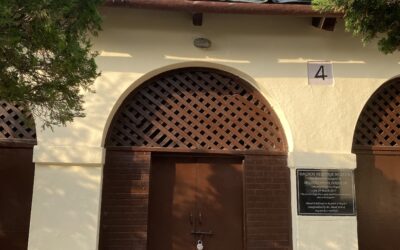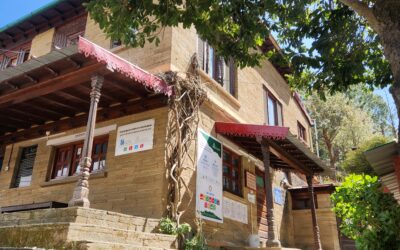With Shram Sarathi, I have been working with migrants who have been given training on various skill-sets so that they can start their own enterprise or fetch better income using those skills. However, only a few trainees show the courage and interest to start something of their own. Lack of financial support makes it worse as many of them have to shut their enterprise in initial months or they are not able to grow it as per the market potential. Additionally, lack of working capital does not allow them to have a long operational cycle and makes it difficult to compete against well settled competitors.
This story is of Mr. Kantilal, from a remote village of Salumber block of Udaipur district. He is a resident of Oda village in Mora hamlet. The village is sparsely populated with 100 tribal households. Most of the people are well educated as compared to nearby villages. Even if we compare in terms of per-capita income, this village is ahead. Many families are dependent on income earned through different sources from migration. 50% of migrants go for long duration, mainly to Ahmedabad, Surat, Mumbai and Udaipur. Long Duration Migrants are majorly employed in construction and hospitality industries as marble fitter, marble polisher, cook, waiter and helper. 25% of them are daily commute migrants who work in nearby blocks and at panchayat level as masons, helpers and NREGA workers. Rest of people are associated with government services as primary school teachers, accountants, supervisors etc.
Kantilal has a family of 4 with two kids and a wife. Both the children go to Ma-wadi center. Wife looks after the house and fields while Kantilal commutes daily to Sabla for work. He is the only earning member of the family and manages somewhere between Rs. 15,000 to Rs. 20,000 per month. Household expenses and his personal expenses accumulate to around Rs. 8,000 a month and they manage to save the rest. This has started happening recently.
There was a time when Kantilal used to work as a waiter at a hotel in Ahmadabad at a monthly salary of Rs 5,000. He was there for 2 years until one day, when his employer misbehaved with him. He realised that even after being a graduate, he was working as a slave, having to tolerate the abusive behaviour. Upon this realisation, he decided to quit the waiter’s job and do something else. He came back home and enrolled himself in a training course in Udaipur for motor-winding and electric-fitting. Meanwhile, he talked to shopkeepers and customers, and built his own network here. Initially, he would earn Rs. 100 – 150 a day and kept on reaching more number of customers.
During this phase, he did not have a regular income source and had no savings either. He was under the burden of fulfilling family responsibilities and was living in a make-shift tent house. With a lot of continuous struggle and limited savings, he started building his house but his saved up money could not do much other than giving him a start. A semi constructed house and almost no more money to put in, was enough for his distress. Starting his own business looked impossible now.
Going back to Ahmadabad was the last resort but he could not forget his past experiences. At that point of time, he managed to avail a micro loan of Rs 10,000 through which he managed to put a shed on his house. This loan came as lifeline or else he would have booked his tickets to Ahmadabad. Now that his family could live safely under a shed, he could focus on his work. He started his work of light-fitting and motor-winding in Sabla. He started getting orders incrementally and there was substantial increase in his business. The visits to client locations increased and hence, he involved one of his friends to take care of his shop. His daily income rose to Rs. 600-700 and he would work for 20-25 days a month. After taking another loan of Rs 30,000, he finished his house construction and set-up a small shop at home itself. Now, he works part-time from home, in mornings and evenings, earns from his shop in Sabla and from client visits. He has diversified his business and sources of income.
Today, Kantilal has emerged as an entrepreneur. His struggles from being a waiter in Ahmadabad to being self employed at his home are inspiring. A man who went through abuses and loss of self-respect is now an employer himself. Though there were many players who helped him during his journey of becoming an entrepreneur, it was mostly his courage and determination that helped him come out of poverty and distress migration. Similar to the story of Kantilal, there are many people I met this year who have turned the winds in their favour.




0 Comments